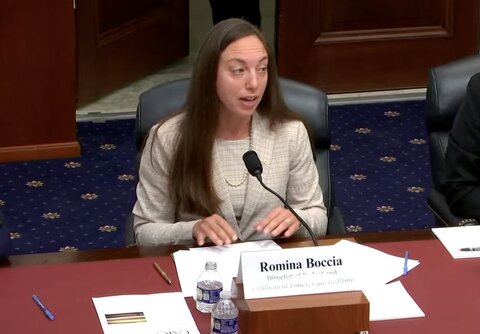Below are abbreviated remarks I delivered before the US House Committee on the Budget on December 11, 2024. You can find my full testimony here and watch the hearing here (my remarks are at 20:15 ‑25:55).
Chairman Arrington, Ranking Member Boyle, and distinguished members of the Committee,
Thank you for the opportunity to testify today.
My name is Romina Boccia and I am the Director of Budget and Entitlement Policy at the Cato Institute, a nonpartisan public policy research organization in Washington, DC.
The fiscal health of the United States is at a critical juncture. Rising debt and persistent deficits threaten to undermine our economic prosperity, national security, and the opportunities enjoyed by working Americans and their families.
Without significant reform, we risk a severe fiscal crisis that could diminish America’s economic leadership and undermine our national security.
There is still hope. History and international experiences demonstrate that with the right institutional reforms, even the most challenging fiscal situations can be overcome.
The US debt at 100 percent of GDP with annual deficits above 6 percent of GDP is primarily driven by irresponsible emergency spending, unsustainable entitlement spending—including ever-increasing benefit levels for Social Security and Medicare beneficiaries that outpace inflation—and the rising cost of interest on the debt.
As the debt grows, interest rates are getting pushed up. Interest payments now exceed what the government spends on defense. This will constrain the government’s ability to respond to the next major emergency or economic crisis.
To address the spending-driven debt crisis, institutional reforms like a balanced budget amendment (BBA) could serve as a critical commitment device to guide fiscal policy. A well-designed BBA would require Congress to balance revenues and expenditures over the business cycle, allowing for flexibility during recessions or emergencies but ensuring long-term fiscal stability.
International experience shows that fiscal rules can succeed when they are sufficiently firm, necessarily flexible, and broadly supported.
Switzerland’s constitutional debt brake, adopted in 2003, balances its budget based on economic conditions. Any deviations from spending caps are recorded in a compensation account, which mandates future corrections. The debt brake has proven highly effective, reducing public debt relative to GDP and fostering long-term fiscal stability while maintaining flexibility for emergencies like economic crises, and also paying down those emergency expenditures after the crisis concludes.
Germany’s constitutional debt brake introduced in 2009 limits structural deficits. The framework allows for temporary suspension during crises, provided a repayment plan is established. Oversight by the independent Stability Council ensures accountability. This rule has stabilized Germany’s debt trajectory, even as it accommodated emergency spending during the COVID-19 pandemic, reinforcing trust in fiscal discipline.
In the 1990s, Sweden implemented a fiscal framework with three key pillars: a surplus target over the business cycle, multi-year spending caps, and a debt anchor or debt stabilization target. These rules are monitored by an independent Fiscal Policy Council. Sweden’s structural reforms, such as tying pension benefits to life expectancy and converting a portion of their social security to defined contribution plans, have complemented its fiscal rules, preserving its welfare state without bankrupting the nation.
A BBA alone cannot resolve the nation’s fiscal challenges. It must be accompanied by credible reforms to entitlement programs and structural spending constraints.
Congress could also adopt a BRAC-like fiscal commission to propose reforms and overcome political gridlock—one modeled after the successful Base Realignment and Closure commission.
Such a commission would provide independent recommendations in response to clear and narrow congressional guidelines such as stabilizing the debt below the size of the US economy or achieving primary balance by a certain year. Recommendations could be self-executing, subject to congressional disapproval with expedited consideration, facilitating the adoption of necessary but politically sensitive changes.
The risks of continued inaction are profound. Credit rating agencies have already warned of the dangers of political dysfunction and fiscal irresponsibility. Fitch and Standard & Poor’s downgraded the US debt, while Moody’s altered the US outlook to negative. Subsequent potential downgrades loom, given the US trajectory.
Worse, due to the unique nature of the US dollar as the world’s preeminent reserve currency, bondholders may not send early warning signals. In other words, we may be missing the canary in the coal mine.
The US dollar’s status has created complacency among policymakers. Investor behavior, influenced by herd mentality and the winner-take-all nature of the global bond market, may trigger a self-reinforcing debt doom loop of bond sales and rising interest rates without advance warning. Historically, as Reinhart and Rogoff note in This Time Is Different, debt crises most often arise not from gradual decline but from a sudden collapse in investor confidence.
We shouldn’t find out where the fiscal cliff is by going off it.
Policymakers can chart a new course by adopting a debt brake or balanced budget amendment and pursuing entitlement reforms, possibly by empowering a BRAC-like fiscal commission. International models show the way, but decisive action is needed now to safeguard the United States of America.
Thank you, and I look forward to your questions.












